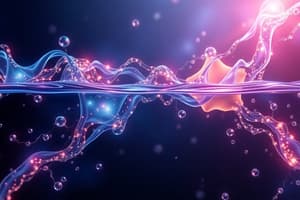Podcast
Questions and Answers
What is the cause of acidosis?
What is the cause of acidosis?
- Low PCO2
- High pH
- High PCO2 (correct)
- Low bicarbonate levels
How do the kidneys compensate for respiratory acid-base imbalance?
How do the kidneys compensate for respiratory acid-base imbalance?
- Eliminating bicarbonate
- Increasing PCO2
- Retaining bicarbonate (correct)
- Decreasing pH
What reflects problems with fluid, electrolyte, and acid-base balance in the young?
What reflects problems with fluid, electrolyte, and acid-base balance in the young?
- Low residual lung volume
- Low metabolic rate
- Efficiency of kidneys in infants
- High rate of insensible water loss (correct)
At what age does the water content of the body decline until adulthood?
At what age does the water content of the body decline until adulthood?
What may elders be unresponsive to, putting them at risk of dehydration?
What may elders be unresponsive to, putting them at risk of dehydration?
What is the characteristic of alkalosis?
What is the characteristic of alkalosis?
What is the approximate percentage of water content in healthy males?
What is the approximate percentage of water content in healthy males?
Where is interstitial fluid found?
Where is interstitial fluid found?
Which factor contributes to the difference in water content between healthy males and females?
Which factor contributes to the difference in water content between healthy males and females?
What is the approximate percentage of water content in infants?
What is the approximate percentage of water content in infants?
Which is a major subdivision of extracellular fluid (ECF)?
Which is a major subdivision of extracellular fluid (ECF)?
Where is intracellular fluid (ICF) contained?
Where is intracellular fluid (ICF) contained?
What is the role of estrogens in electrolyte and water balance?
What is the role of estrogens in electrolyte and water balance?
How does potassium balance affect heart conduction?
How does potassium balance affect heart conduction?
What is the role of aldosterone in potassium balance?
What is the role of aldosterone in potassium balance?
What is the function of PTH in calcium regulation?
What is the function of PTH in calcium regulation?
What is the role of amphoteric molecules in acid-base balance?
What is the role of amphoteric molecules in acid-base balance?
What is the major anion in the extracellular fluid (ECF)?
What is the major anion in the extracellular fluid (ECF)?
How do the kidneys regulate acid-base balance?
How do the kidneys regulate acid-base balance?
What are the normal pH levels of arterial blood, venous blood, and intracellular fluid, respectively?
What are the normal pH levels of arterial blood, venous blood, and intracellular fluid, respectively?
What is the consequence of respiratory acidosis?
What is the consequence of respiratory acidosis?
How do the kidneys respond to acidosis?
How do the kidneys respond to acidosis?
What is the function of Type B intercalated cells in the kidneys during alkalosis?
What is the function of Type B intercalated cells in the kidneys during alkalosis?
What is a common cause of metabolic acidosis?
What is a common cause of metabolic acidosis?
What triggers thirst in the body?
What triggers thirst in the body?
What is the role of Antidiuretic hormone (ADH) in the body?
What is the role of Antidiuretic hormone (ADH) in the body?
What causes hypotonic hydration?
What causes hypotonic hydration?
What is the function of Aldosterone in the body?
What is the function of Aldosterone in the body?
What is the consequence of dehydration?
What is the consequence of dehydration?
What is the main role of electrolytes like sodium in the body?
What is the main role of electrolytes like sodium in the body?
Flashcards are hidden until you start studying
Study Notes
Fluid and Electrolyte Balance in the Body
- Water intake must balance water output to maintain proper hydration
- Sources of water intake include ingested fluid, solid food, and metabolic water
- Water output occurs through urine, feces, insensible losses, and sweat
- Thirst is triggered by a decline in plasma volume or an increase in plasma osmolality
- Obligatory water losses include insensible water losses and water in feces
- Antidiuretic hormone (ADH) regulates water reabsorption in the collecting ducts
- Factors triggering ADH release include fever, sweating, vomiting, and blood loss
- Dehydration causes negative fluid balance and may lead to hypovolemic shock
- Hypotonic hydration results from excessive water intake, leading to cellular overhydration
- Edema is an abnormal accumulation of fluid in the interstitial space
- Electrolytes, especially sodium, are crucial for neuromuscular excitability and fluid balance
- Aldosterone regulates sodium reabsorption in the kidneys and is triggered by the renin-angiotensin mechanism
Studying That Suits You
Use AI to generate personalized quizzes and flashcards to suit your learning preferences.




